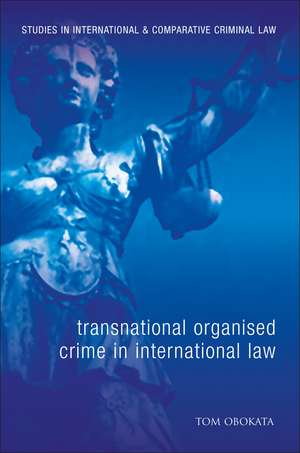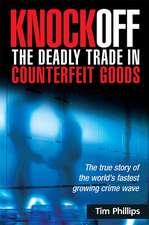Transnational Organised Crime in International Law: Studies in International and Comparative Criminal Law
Autor Professor Tom Obokataen Limba Engleză Hardback – 16 aug 2010
Din seria Studies in International and Comparative Criminal Law
- 30%
 Preț: 897.55 lei
Preț: 897.55 lei - 21%
 Preț: 275.26 lei
Preț: 275.26 lei - 18%
 Preț: 358.30 lei
Preț: 358.30 lei - 30%
 Preț: 540.65 lei
Preț: 540.65 lei - 27%
 Preț: 345.42 lei
Preț: 345.42 lei - 28%
 Preț: 465.96 lei
Preț: 465.96 lei - 27%
 Preț: 442.83 lei
Preț: 442.83 lei - 27%
 Preț: 501.70 lei
Preț: 501.70 lei - 14%
 Preț: 603.73 lei
Preț: 603.73 lei - 14%
 Preț: 509.52 lei
Preț: 509.52 lei - 24%
 Preț: 374.34 lei
Preț: 374.34 lei - 11%
 Preț: 374.34 lei
Preț: 374.34 lei - 30%
 Preț: 779.33 lei
Preț: 779.33 lei - 30%
 Preț: 774.62 lei
Preț: 774.62 lei - 30%
 Preț: 893.89 lei
Preț: 893.89 lei - 24%
 Preț: 190.33 lei
Preț: 190.33 lei - 18%
 Preț: 302.99 lei
Preț: 302.99 lei - 18%
 Preț: 297.86 lei
Preț: 297.86 lei - 18%
 Preț: 319.86 lei
Preț: 319.86 lei - 30%
 Preț: 603.81 lei
Preț: 603.81 lei - 30%
 Preț: 718.27 lei
Preț: 718.27 lei
Preț: 570.02 lei
Preț vechi: 816.68 lei
-30% Nou
Puncte Express: 855
Preț estimativ în valută:
109.09€ • 113.47$ • 90.06£
109.09€ • 113.47$ • 90.06£
Carte tipărită la comandă
Livrare economică 15-29 aprilie
Preluare comenzi: 021 569.72.76
Specificații
ISBN-13: 9781841136905
ISBN-10: 1841136905
Pagini: 258
Dimensiuni: 156 x 244 x 20 mm
Greutate: 0.57 kg
Editura: Bloomsbury Publishing
Colecția Hart Publishing
Seria Studies in International and Comparative Criminal Law
Locul publicării:London, United Kingdom
ISBN-10: 1841136905
Pagini: 258
Dimensiuni: 156 x 244 x 20 mm
Greutate: 0.57 kg
Editura: Bloomsbury Publishing
Colecția Hart Publishing
Seria Studies in International and Comparative Criminal Law
Locul publicării:London, United Kingdom
Notă biografică
Tom Obokata is a Senior Lecturer in Law at the Queen's University, Belfast.
Cuprins
1 Introduction 1.1 The Rise of Organised Crime 1.2 Contemporary Manifestation of Organised Crime 1.3 The Scope and Aim of This Book Part I: Concepts, Norms and Principles 2 Understanding Organised Crime from a Multi-Disciplinary Perspective 2.1 Introduction 2.2 Concepts of Organised Crime from a Multi-disciplinary Perspective 2.2.1 Organised Crime as a Set of Actors 2.2.2 Organised Crime as a Set of Activities 2.3 Legal Defi nitions of Organised Crime in National and International Law 2.3.1 Defi nitions of Organised Crime in International Law 2.3.1.1 General Discussion 2.3.1.2 The Transnational Nature of Organised Crime 2.3.1.3 'Transnational'and 'International' Crime 2.3.2 Defi nitions of Organised Crime in National Law 2.4 Conclusions 3 Obligations of States under International Law 3.1 Introduction 3.2 The Nature and Extent of Obligations under International Law 3.2.1 Prohibition of Organised Crime and Associated Acts 3.2.2 Criminal Jurisdiction over Organised Crime 3.2.3 Special Investigative Techniques and Intelligence-Led Law Enforcement 3.2.4 Mutual Assistance in Criminal Matters 3.2.4.1 Extradition 3.2.4.2 Other Mutual Legal Assistance 3.2.5 Prevention of Organised Crime 3.3 Key Legal Challenges Facing Effective Implementation of Obligations 3.3.1 Periods of Limitations for Organised Crime 3.3.2 Immunity of Government Offi cials and Diplomats 3.3.3 Protection of Human Rights of Suspects/Defendants 3.4 Conclusions 4 The Role of Non-state Actors in Suppression and Prevention of Organised Crime 4.1 Introduction 4.2 The Role of Non-state Actors in Prevention and Suppression of Organised Crime 4.2.1 The Concept of Global Governance 4.2.2 Global Governance over Transnational Organised Crime 4.2.2.1 Decision-Making and Participation 4.2.2.2 Accountability 4.2.2.2.1 Individual Criminal Responsibility 4.2.2.2.2 Criminal Organisations 4.2.2.2.3 Legal Persons 4.2.2.2.4 International Organisations 4.3 Towards an Inclusive Notion of the 'International Community' 4.4 Conclusions Part II: Enforcement of Norms and Principles 5 National Case Studies of Thailand, Serbia, Kosovo and the UK 5.1 Introduction 5.2 Thailand 5.2.1 Legal Framework to Address Organised Crime 5.2.1.1 Legislation on Substantive Offences 5.2.1.2 Legislation on Criminal Procedure and International Co-operation 5.2.1.2.1 Criminal Jurisdiction and Investigative Powers 5.2.1.2.2 The Rights of Suspects/Defendants, Victims and Witnesses 5.2.1.2.3 Mutual Legal Assistance in Criminal Matters 5.2.2 Assessment of Law Enforcement in Thailand 5.3 Serbia 5.3.1 Legal Framework to Address Organised Crime 5.3.1.1 Legislation on Substantive Offences 5.3.1.2 Legislation on Criminal Procedure and International Co-operation 5.3.1.2.1 Criminal Jurisdiction and Investigative Powers 5.3.1.2.2 The Rights of Suspects/Defendants, Victims and Witnesses 5.3.1.2.3 Mutual Legal Assistance in Criminal Matters 5.3.2 Assessment of Law Enforcement in Serbia 5.4 Kosovo 5.4.1 Legal Framework to Address Organised Crime 5.4.1.1 Legislation on Substantive Offences 5.4.1.2 Legislation on Criminal Procedure and International Co-operation 5.4.1.2.1 Criminal Jurisdiction and Investigative Powers 5.4.1.2.2 The Rights of Suspects/Defendants, Victims and Witnesses 5.4.1.2.3 Mutual Legal Assistance in Criminal Matters 5.4.2 Assessment of Law Enforcement in Kosovo 5.5 The UK 5.5.1 Legal Framework to Address Organised Crime 5.5.1.1 Legislation on Substantive Offences 5.5.1.2 Legislation on Criminal Procedure and International Co-operation 5.5.1.2.1 Criminal Jurisdiction and Investigative Powers 5.5.1.2.2 The Rights of Suspects/Defendants, Victims and Witnesses 5.5.1.2.3 Mutual Legal Assistance in Criminal Matters 5.5.2 Assessment of Law Enforcement in the UK 5.6 Comparative Analysis 5.7 Conclusions6 The EU and Transnational Organised Crime 6.1 Introduction 6.2 Law, Policies and Measures under the TEU 6.2.1 Overview 16.2.2 Analysis of the TEU Measures 6.3 Law, Policies and Measures under the TEU as Revised by the Treaty of Amsterdam 6.3.1 Overview 6.3.2 Approximation of National Laws 6.3.3 Mutual Recognition of Judicial Decisions 6.3.4 The Principle of Availability-Intelligence Exchange 6.3.5 Analysis of Measures under the TEU as Revised by the Treaty of Amsterdam 6.3.5.1 Application of Approximation, Mutual Recognition and the Principle of Availability 6.3.5.2 Other Issues 6.4 The Future of the EU Action against Organised Crime in Light of the Lisbon Treaty 6.5 Conclusions 7 International Responses to Transnational Organised Crime 7.1 Introduction 7.2 Monitoring Implementation of the Organised Crime Convention 7.3 Provision of Technical Assistance 7.4 International Co-operation 7.4.1 Inter-state Co-operation 7.4.2 Inter-Agency Co-operation: UNIAP 7.5 Conclusions 8 Conclusion Selected Bibliography Books and Articles Reports and Working Papers
Recenzii
Transnational Organised Crime in International Law is an important contribution to the field. The book offers well-organised and lucid analysis of concepts and case studies that may interest both academicians and practitioners and is accessible for the casual reader who is interested in an introduction to the subject matter.
Tom Obokata has written the most useful and comprehensive book that sheds light upon the complex relationship between organised crime and international law. As both crime and law become evermore 'transnational' it is essential that concerned police officials, lawyers and judges as well as academics have such well researched in-depth assistance which is what this excellent work provides. Written in a very readable and lucid style it should form part of every international lawyer's library
... a welcome addition in a research field which has seen significant developments in the last years, but a relatively low number of scholarly works.... a thorough analysis of the relationship between organized crime and international criminal law
Tom Obokata has written the most useful and comprehensive book that sheds light upon the complex relationship between organised crime and international law. As both crime and law become evermore 'transnational' it is essential that concerned police officials, lawyers and judges as well as academics have such well researched in-depth assistance which is what this excellent work provides. Written in a very readable and lucid style it should form part of every international lawyer's library
... a welcome addition in a research field which has seen significant developments in the last years, but a relatively low number of scholarly works.... a thorough analysis of the relationship between organized crime and international criminal law
Descriere
This book offers a critical analysis of developments in the field of transnational organised crime under international law.









